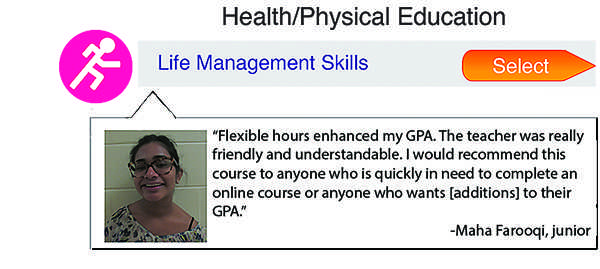Virtual school classes broaden students’ future opportunities
Initiative. Universities clamor for students with this valuable trait- the ambition, motivation and focused personality that breeds success. Often times students demonstrate their drive by overloading on AP classes, which can backfire when stress piles up.
Virtual school provides the opportunity to remove a period from the school day. It’s free, and offers a vast buffet of core classes, electives and even career certifications.
Not only do online classes showcase college readiness, they are also the rare combination of “resume-booster” and actual “useful experience.”
“At some point during four years of college you may encounter having to take an online class, especially if you’re planning on going to a large university,”
Lauren Spinka, college resource officer, said, “So taking an online class in high school is to gain some experience on how to be successful in that online format.” Learning to communicate with a teacher and fellow students in an academic setting translates well to a business environment.
“In a lot of career fields today, a lot of communication is going to take place online, a lot of components of your career may be in an online format, because we have a global market now,” Spinka said.
Taking a class that provides certification in Microsoft programs is a real wow-factor when applying for any job, and can set a student apart from other applicants.
“I personally think another benefit is being able to navigate the online world and be successful in learning how to communicate with your teacher,” Spinka said, “and can translate to effective communication in an online market.”
Reaching beyond the online class, graduation requirement requires a commitment of time and energy.
“I went to a panel of a lot of the state university college representatives, the way they explained it was if you can demonstrate that that opportunity isn’t available to you at school, they won’t view it negatively if you leave your high school in order to increase academic rigor.” Spinka said.
It is certainly tempting for students to pick up a free class that lets them leave early, but Spinka warns of the consequences.
“If you’re leaving to take a less rigorous class so you don’t have to be at school, thats going to be obvious. They want to see that you’ve maximized your impact on this community first.”
Media Specialist Sharon Schram often sees a few students in the library working on their virtual school classes. “It would be a good use of the resources,” Schram said, “But I wouldn’t want the computers to only be for virtual school, other schools have that policy, and it really restricts classes from coming in.”
Students who are attempting credit recovery can find a quiet place on campus by taking the Credit Recovery class, or by taking Research.
But James Tagg, sophomore, takes a different approach to virtual school, one that has been shared by past valedictorians.
“I take Geometry and Algebra 2 to get ahead,” Tagg said, “The coursework is good. The only thing is the facts and questions are more difficult, but the explanations are simple and easy to understand.”
Virtual school requires diligence. A student must submit a certain amount of work per week, a quota that varies with each course. Some students may have trouble focusing on the lesson while fighting the natural urge of the Internet, but the same distractions apply to college life.
“Even if you attend every class in college, you’re still going to have to independently get yourself up and there on a weekly basis and be accountable.” Spinka said. “That component of self motivation is very important.”

